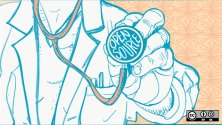The healthcare industry is experiencing off-the-charts growth in data generation. Growing numbers of clinical solutions generate more data every day--including electronic medical records, communication systems, and digital image archiving. On top of that, wearable sensor networks compile information on patients' heart rate, brain activity, sleep patterns, temperature, muscle motion, and numerous other clinically useful data points. This enhanced ability to capture data from everywhere generates massive sets of information. This information is invaluable for healthcare and modern clinical practices--as long as we can manage it properly.
The true power of big data is realized when we have easy ways of compiling, clarifying, and understanding it. Data points, in isolation, aren't as meaningful or useful—but when data is compared or contrasted, it has more relevance. The success of real-time feedback indicates that increased transparency of big data analysis can create tremendous value. It can help individuals make better health care choices (and potentially cut costs). It can also make data more accessible to healthcare providers and relevant stakeholders in a timely manner.
Making data available completely and quickly creates the potential for new discoveries and breakthroughs, as well as more timely responses to injury or illness. The faster healthcare providers can come to a diagnosis, the earlier treatment can begin. Better data can potentially improve overall performance in healthcare--not just improved process (and lower cost) but also better outcomes for patients.
Some healthcare professionals are already using big data analysis systems to drive information transparency--and many find that it is a disruptive change.
Duncan Henry, a decision support analyst working with Loma Linda University Health Care, recently rolled out Pentaho, a business analytics, data integration, and big data capabilities platform. Pentaho is used in billing and operations to support approximately 500,000 patients and 600 doctors.
Loma Linda chose this solution because it needed to ensure HIPAA compliance with an easy-to-use system. Henry said, “Information transparency was at first a difficult transition.” The organization's culture shifted towards facts-based decision-making. He further explained that some departments previously had their own data silos, but with the adoption of Pentaho's business analytics solution, inter-group collaboration became much more common. “When we opened our eyes, our productivity went way up,” said Henry.
Dr. Ron Saizow at the Oklahoma School of Community Medicine also adopted Pentaho's business analytics solution, using it to track data on diabetic patients at the free, student-run clinic he manages. His primary goal was to improve and streamline care by providing analyzed data for the care teams. Using Pentaho, Dr. Saizow is able to track hemoglobin, blood pressure, and other data for more than 300 patients. His student team was very surprised by the data from their first Pentaho report, but the group quickly discovered that the ability to generate historical trends allowed them to better predict a patient's health needs and plan for future care. Implementation of big data analysis helped improve the quality of care they could provide.
While the benefits of utilizing and analyzing big data are great, the challenges are not trivial. Efficient healthcare record-keeping has been constrained by disparate healthcare ecosystems. Groups grapple with data silos, niche vendors, and a general lack of investment. This fuels the reliance on traditional approaches and legacy systems that make it nearly impossible to streamline information search and analysis. And organizations who do manage to shift from legacy systems to ones that can take advantage of big data are concerned about data security. Any system used with sensitive healthcare information must secure, retain, and--at times--delete identified and de-identified data in compliance with ever-changing regulatory requirements.
Governance of big data is still in the early stages, but more information and improved analysis holds great promise. Healthcare has always been a science of data discovery. The earliest clinicians developed new and better ways to unlock the secrets of our biological bodies, and of the organisms and diseases that cause illness. Modern improvements in health and healthcare systems allow individuals to further amass and analyze data, and unlock even more secrets about human health and healthcare.






Comments are closed.